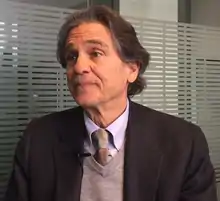Ted Kaptchuk
Ted Jack Kaptchuk (born August 17, 1947) is an American medical researcher who holds professorships in medicine and in global health and social medicine at Harvard Medical School. He researches the placebo effect within the field of placebo studies.

Early life and education
Kaptchuk was born in Brooklyn, New York;[1] his parents were both Polish Holocaust survivors.[2] He holds a B.A. in East Asian Studies from Columbia University, where he co-founded the university's chapter of Students for a Democratic Society,[2] and a degree in Chinese medicine from the Macao Institute of Chinese Medicine.[3] (He had wanted to study in mainland China, and had representatives of the Black Panthers request permission on his behalf from the Chinese government, but was denied.)[2]
Career
Kaptchuk had an herbal and acupuncture clinic in Boston for many years starting in 1976.[2] In the 1980s he was clinical director of the Pain Unit at Lemuel Shattuck Hospital.[3] In 1990, he became associate director of the Center for Alternative Medicine Research and Education at Beth Israel Deaconess Medical Center, also in Boston.[2] In 2011, he became Director of the Harvard Program in Placebo Studies and the Therapeutic Encounter at Beth Israel Deaconess.[2][4] Although he does not have a medical degree,[2] he has been a faculty member at Harvard Medical School since 1998, a professor of medicine since 2013, and professor of global health and social medicine since 2015.[3]
Kaptchuk has led many studies of the placebo effect, including work suggesting that placebos may still work despite disclosure that they are placebos.[5][6][7]
Kaptchuk has served on panels for the NIH and FDA, and worked as a medical writer for the BBC. He has written more than 250 peer-reviewed publications. The New Yorker listed his work among "The Most Notable Medical Findings of 2015".[8]
Personal life
Kaptchuk is an observant Jew.[2]
Books
- The Web That Has No Weaver: Understanding Chinese Medicine, New York: McGraw-Hill, 1983. ISBN 978-0-8092-2840-9
- The Healing Arts: Exploring the Medical Ways of the World, Summit Books, 1987. ISBN 978-0-671-64506-9
- Miller FG, Colloca L, Crouch RA, Kaptchuk TJ (eds). The Placebo: A Reader. Baltimore: Johns Hopkins University Press, 2013.
References
- Contemporary Authors New Revision Series: A Bio-Bibliographical Guide to Current Writers in Fiction, General Non-Fiction, Poetry, Journalism, Drama, Motion Pictures, Television, & Other Fields. Gale. 2003. p. 282. ISBN 9780787667146.
- Michael Specter (December 12, 2011). "The Power of Nothing". The New Yorker.
- Ted J. Kaptchuk. "Biography". tedkaptchuk.com. Retrieved 2019-02-11.
- "Ted Kaptchuk of Harvard Medical School studies placebos". Harvard Magazine. January–February 2013.
- Alexandara Sifferlin (August 23, 2018). "People are taking placebo pills to deal with their health problems—and it's working". Time.
- Gary Greenberg (November 7, 2018). "What if the placebo effect isn't a trick?". The New York Times.
- Brian Resnick (July 11, 2017). "A radical new hypothesis in medicine: give patients drugs they know don't work". Vox.
- "The Most Notable Medical Findings of 2015". The New Yorker.
Selected publications
- All the world's a stage: including the doctor's office: National Public Radio's Hidden Brain.
- Placebo: Can the mind cure you? https://gimletmedia.com/shows/science-vs/5whgzd/placebo-can-the-mind-cure-you